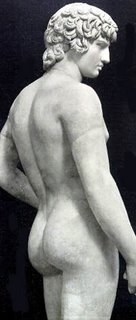 Since the diminution of the Jesuit educational system, we artists can no longer count on the average audience understanding many Western cultural references that used to be taken for granted: the Classical, Mythological, Biblical, Shakespearean former pillars of cultural literacy. However, our librettist, in his bull-headedness, has chosen to ignore this fact, to eschew the requisite references to pop song lyrics and celebrity couplings and instead to rely on some of those very allusions, those facts unavailable to all of us whose education consisted merely of smoking dope in the girl's restroom and leaving thumbtacks on the teacher's chair until that sad day when social promotions pushed us out into the real world, woefully unprepared for highbrow operas. So, to remedy that, I will give a brief rundown of one that appears in the abridgement of Mordake which we are about to witness.
Since the diminution of the Jesuit educational system, we artists can no longer count on the average audience understanding many Western cultural references that used to be taken for granted: the Classical, Mythological, Biblical, Shakespearean former pillars of cultural literacy. However, our librettist, in his bull-headedness, has chosen to ignore this fact, to eschew the requisite references to pop song lyrics and celebrity couplings and instead to rely on some of those very allusions, those facts unavailable to all of us whose education consisted merely of smoking dope in the girl's restroom and leaving thumbtacks on the teacher's chair until that sad day when social promotions pushed us out into the real world, woefully unprepared for highbrow operas. So, to remedy that, I will give a brief rundown of one that appears in the abridgement of Mordake which we are about to witness.In the introduction, in reference to Edward Mordake himself, we find that "his face was that of Antinous." We ask: who is this Antinous? I say to you that he was a beautiful boy who, around about age 11, become the lover of the Roman Emperor Hadrian, in the fashion of the day, following the Greek tradition of the eromenos, to wit, the idealized pederastic relationship between an adolescent boy and an adult man, both best friends forever and pure lovers, seen to be part of aristocratic moral and educational development, military training, and, of course, Intercrural Sex, which you can look up for yourself in any accurate biography of Honest Abe Lincoln. At around age 18, possibly in an attempt to save his beloved emperor, Antinous drowned in the Nile. Hadrian's grief was unbounded and, following in the footsteps of the great Alexander, had Antinous proclaimed a god. Worship was widespread throughout the empire. There were cities named after him, temples built for his worship, festivals in his honor, a constellation named after him (until the regularization of the constellations by the International Astronomical Union in the 1930s), and many
 many statues and coins and busts and gems bearing his likeness, all recording his famous pouting lips, considered his most distinctive feature.
many statues and coins and busts and gems bearing his likeness, all recording his famous pouting lips, considered his most distinctive feature.My favorite quote about Antinous (although unrelated to the story at hand) is this homophobic number from Gibbon's Decline and Fall of the Roman Empire:
The deification of Antinous, his medals, statues, city, oracles, and constellation, are well known, and still dishonor the memory of Hadrian. Yet we may remark, that of the first fifteen emperors, Claudius was the only one whose taste in love was entirely correct.





No comments:
Post a Comment